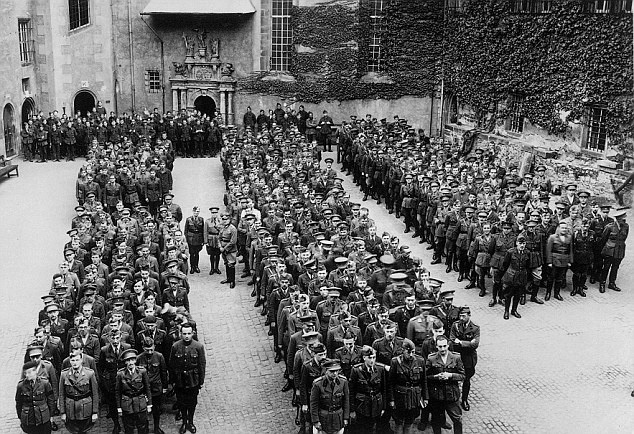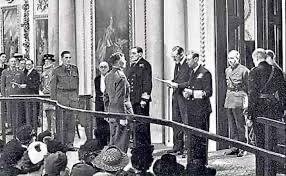In honor of ANZAC day on the 25th of April, I wanted to share a story about an amazing ANZAC soldier. For those unfamiliar, ANZAC is the acronym formed from the initial of the Australian and New Zealand Army Corps. It started when the Australian and New Zealand soldiers in Egypt were grouped before the landing on Gallipoli in April 1915. The acronym was first written as “A & NZ Army Corps”; however, clerks in the corps headquarters soon shortened it to ANZAC as a convenient telegraphic code name for addressing telegram messages. Australia and New Zealand both observe ANZAC Day, which is their Memorial Day to remember their fallen. It starts with a sunrise service, followed by ANZAC biscuits and beer with brothers and family. ANZAC Day started as a remembrance of the invasion of Gallipoli (a plan hatched by Winston Churchill, the First Lord of the Admiralty in WWI), but now it is used as a Remembrance Day for all who have been lost to war.
I had the privilege of spending an ANZAC day in Perth a few years back and it was amazing to see how similar we are to our brothers in the Pacific. So, on the 25th of April, raise a glass to all of our brothers that have helped support us in everything we have done and helped promote freedom in the world. The ANZACs are the only countries that have been with the U.S. in every war we have fought since WWI, including Vietnam and the Global War on Terror.
Now….to the amazing soldier I mentioned.
Charles Upham is a true warrior in every sense of the word. He was a Captain in the 20th BN, 2nd New Zealand Expedition Force who served in Europe and North Africa during WWII. He is considered the highest decorated Commonwealth soldier of the war. Captain Upham is one of only three people to receive the Victoria Cross (VC) twice (the UK’s version of the Medal of Honor). He is the only person to receive the award twice in World War II.

Only three men in history have earned a second VC. The other two who managed this feat were medical officers: Col A. Martin-Leake, who received it in the Boer War and the First World War; and Capt N. G. Chavasse, killed in France in 1917, who was the only soldier to be awarded the VC twice during World War I. Interestingly, Chavasse’s family was related to Upham’s.
Captain Upham was awarded his first VC in May 1941 during the Battle of Crete on the Greek island. Upham led his platoon over 3,000 yards without heavy weapons during the initial phases of the fighting and took a heavily defended German position head-on. He single handly destroyed 3 German machine gun positions with grenades and a pistol coming within a dozen yards of the last. Afterward, he helped evacuate the wounded under heavy fire, and when it appeared an entire company was about to be cut off in the fighting, he was sent to retrieve them. He covered over 600 yards through enemy territory to recover the platoon and led them to safety. He would later organize a counterattack on the advancing German forces that killed over 50 of the enemy before falling back. As he pressed forward, 2 Germans popped out and fired upon him, where Upham played dead. He crawled to a tree with only one functioning arm to prop up the rifle and took out the two Germans as they advanced upon him. Later, still heavily wounded, he led his platoon and, through clever tactics, duped a section of German troops into exposing themselves, at which point he quickly cut down 22 with a Bren light machine gun.
The Battle of Crete lasted 11 days, and when it was over, Upham had put together an excellent resume for gallantry that could only be rewarded with the United Kingdom’s highest military honor.

He was awarded his second VC while in Egypt during the Battle of El Alamein. During the attack, he was wounded once again. Despite his injuries, he managed to destroy an entire truckload of Germans with hand grenades. He then moved on and destroyed a tank, several gun emplacements, and vehicles, even though he was shot through the elbow and his arm was broken. The enemy launched a massive counterattack. His company held its position till it was reduced to only six survivors. Upham was eventually taken prisoner.

As a POW, Capt. Upham attempted several escapes to include jumping off a moving truck, jumping off a moving train, and, on one occasion, he tried to escape in broad daylight by climbing the fence. When a prison guard threatened to shoot him, Upham calmly ignored him and lit a cigarette. (that’s some James Bond stuff right there). He was later transferred to Colditz Castle and remained there until the end of the war.

It was reported that when King George was told about the recommendation being made for Upham’s second VC, the King remarked to Major-General Howard Kippenberger that a “bar to the cross” would be “very unusual indeed” and enquired firmly and asked, “Does he deserve it?” Kippenberger replied, “In my respectful opinion, sir, Upham has won it several times over.”

After the war, Capt. Upham moved back to New Zealand and became a farmer. It is said that for the remainder of his life, Upham would allow no German manufactured machinery or cars onto his property.


After the war Upham was recommended for a knighthood, which being the typical laconic, self-effecting New Zealand bloke he naturally declined.
Good on him!
Frigging legend